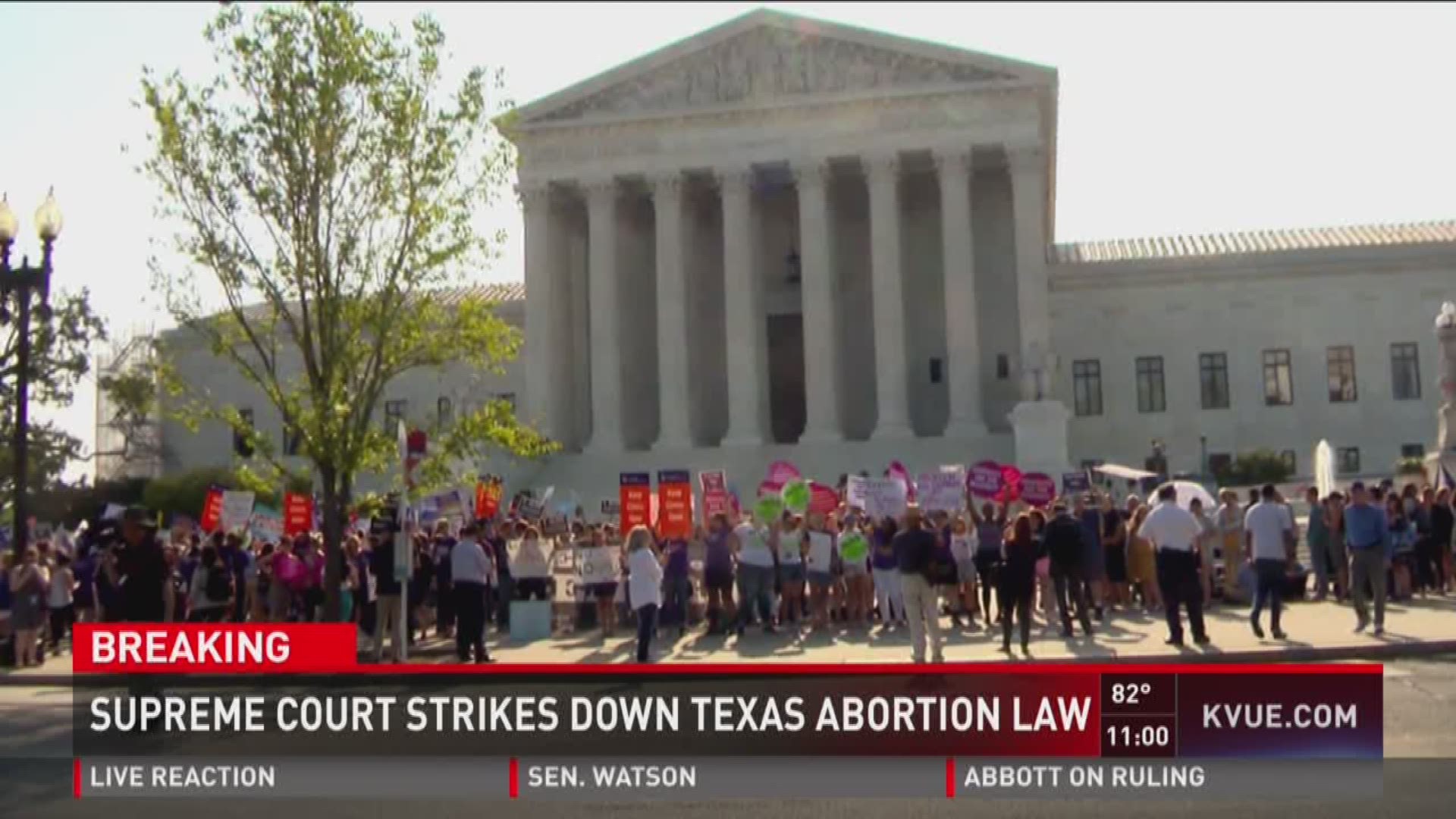The United States Supreme Court struck down parts of Texas' abortion law passed in 2013 in a 5-3 decision announced Monday.
At the heart of the decision announced Monday in the case of Whole Woman's Health vs. Oberfeldt were two requirements: Doctors performing abortions must have admitting privileges and abortion clinics must meet the requirements of a surgical center.
The court invalidated both of those provisions. Justice Stephen Breyer, who wrote the majority decision, stated, "Both the admitting-privileges and the surgical-center requirements place a substantial obstacle in the path of women seeking a previability abortion, constitute an undue burden on abortion access, and thus violate the Constitution"
The Court found that the state of Texas provided no evidence that the admitting privileges served a necessary purpose. Specifically, Justice Breyer said the state of Texas, "does not show how the new law advanced the State’s legitimate interest in protecting women’s health when compared to the prior law, which required providers to have a “working arrangement” with doctors who had admitting privileges."
Breyer continued, "At the same time, the record evidence indicates that the requirement places a “substantial obstacle” in a woman’s path to abortion."
Part of the argument made by the Whole Woman's Health was that it would create lengthy drives for many women seeking abortion. The Court said that increased driving distances "do not always constitute an 'undue burden.'" However, when taken together with the number of clinics that would close under the new law and when viewed "in light of the virtual absence of any health benefit" of the provisions of the law, the justices said it did constitute an undue burden against women seeking an abortion.
The majority justices also stated that the surgical center requirement yielded "few, if any, health benefits for women" and posed a "substantial obstacle to women seeking abortions." Taken together, the surgical center requirement also put an "undue burden" on the constitutional right to abortion, which was guaranteed in the case Casey vs. Planned Parenthood.
The decision by the Supreme Court invalidating the two provisions will reverberate across the United States. Many states had passed similar laws that forced surgical center requirements and admitting privileges on abortion providers. Those provisions are now invalidated across the United States, based on the Court's decision Monday.
Texas Gov. Greg Abbott issued the following statement regarding SCOTUS' decision:
"The decision erodes State's lawmaking authority to safeguard the health and safety of women and subjects more innocent life to being lost. Texas' goal is to protect innocent life, while ensuing the highest health and safety standards for women," the statement said.
Governor Abbott wasn't alone in his condemnation of the SCOTUS decision. Texas Attorney General Ken Paxton and U.S. Senator John Cornyn both blasted the decision in statements.
Paxton said: "HB2 was an effort to improve a minimum safety standards and ensure capable care for Texas women. It's exceedingly unfortunate that the court has taken the ability to protect women's health out of the hands of Texas citizens and their duly-elected representatives."
Cornyn said: "Today's ruling sets a dangerous precedent for states like Texas, which the Constitution makes clear should be free to pass laws that are in the best interests of our citizens. Commonsense (sic) requirements that abortion clinics be held to the same standards as other medical facilities put the health of patient (sic) first, and today's decision is a step back in protecting the well-being of mothers across our state."
The Court's decision came on the final day opinions were released for the term. The Court will now be in recess until the fall when it reconvenes to hear cases for its next term.
Meanwhile, the leaders of the Texas Alliance for Life said the battle is not over.
The executive director told KVUE News he plans to work with other state leaders and health professionals to turn in a proposal on revised health restrictions for abortion clinics in the next legislative session.
He said this is not an issue is not about Roe vs. Wade, but about giving women high-quality care.
"Today is very disappointing for us, we think the Supreme Court has made a very poor decision, and what it means is that tens of thousands of women can continue to be subjected to substandard abortions, and sometimes very abysmal abortion facilities that do not meet the ordinary standard of care,” said Joe Pojman, Texas Alliance for Life Executive Director.
The full decision by the court can be read below:

